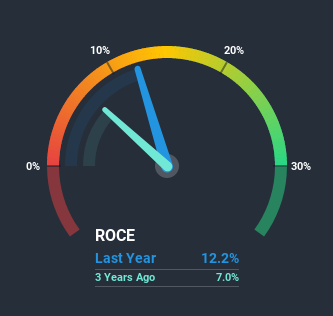- Taiwan
- /
- Medical Equipment
- /
- TWSE:1733
Returns On Capital At Apex Biotechnology (TPE:1733) Paint An Interesting Picture
If you're looking for a multi-bagger, there's a few things to keep an eye out for. One common approach is to try and find a company with returns on capital employed (ROCE) that are increasing, in conjunction with a growing amount of capital employed. This shows us that it's a compounding machine, able to continually reinvest its earnings back into the business and generate higher returns. In light of that, when we looked at Apex Biotechnology (TPE:1733) and its ROCE trend, we weren't exactly thrilled.
What is Return On Capital Employed (ROCE)?
If you haven't worked with ROCE before, it measures the 'return' (pre-tax profit) a company generates from capital employed in its business. The formula for this calculation on Apex Biotechnology is:
Return on Capital Employed = Earnings Before Interest and Tax (EBIT) ÷ (Total Assets - Current Liabilities)
0.12 = NT$212m ÷ (NT$2.6b - NT$895m) (Based on the trailing twelve months to September 2020).
Therefore, Apex Biotechnology has an ROCE of 12%. That's a pretty standard return and it's in line with the industry average of 12%.
Check out our latest analysis for Apex Biotechnology

Historical performance is a great place to start when researching a stock so above you can see the gauge for Apex Biotechnology's ROCE against it's prior returns. If you'd like to look at how Apex Biotechnology has performed in the past in other metrics, you can view this free graph of past earnings, revenue and cash flow.
What The Trend Of ROCE Can Tell Us
We've noticed that although returns on capital are flat over the last five years, the amount of capital employed in the business has fallen 22% in that same period. To us that doesn't look like a multi-bagger because the company appears to be selling assets and it's returns aren't increasing. So if this trend continues, don't be surprised if the business is smaller in a few years time.
Another point to note, we noticed the company has increased current liabilities over the last five years. This is intriguing because if current liabilities hadn't increased to 34% of total assets, this reported ROCE would probably be less than12% because total capital employed would be higher.The 12% ROCE could be even lower if current liabilities weren't 34% of total assets, because the the formula would show a larger base of total capital employed. With that in mind, just be wary if this ratio increases in the future, because if it gets particularly high, this brings with it some new elements of risk.In Conclusion...
It's a shame to see that Apex Biotechnology is effectively shrinking in terms of its capital base. And investors appear hesitant that the trends will pick up because the stock has fallen 30% in the last five years. In any case, the stock doesn't have these traits of a multi-bagger discussed above, so if that's what you're looking for, we think you'd have more luck elsewhere.
If you'd like to know more about Apex Biotechnology, we've spotted 3 warning signs, and 1 of them is a bit concerning.
While Apex Biotechnology may not currently earn the highest returns, we've compiled a list of companies that currently earn more than 25% return on equity. Check out this free list here.
When trading Apex Biotechnology or any other investment, use the platform considered by many to be the Professional's Gateway to the Worlds Market, Interactive Brokers. You get the lowest-cost* trading on stocks, options, futures, forex, bonds and funds worldwide from a single integrated account. Promoted
New: Manage All Your Stock Portfolios in One Place
We've created the ultimate portfolio companion for stock investors, and it's free.
• Connect an unlimited number of Portfolios and see your total in one currency
• Be alerted to new Warning Signs or Risks via email or mobile
• Track the Fair Value of your stocks
This article by Simply Wall St is general in nature. It does not constitute a recommendation to buy or sell any stock, and does not take account of your objectives, or your financial situation. We aim to bring you long-term focused analysis driven by fundamental data. Note that our analysis may not factor in the latest price-sensitive company announcements or qualitative material. Simply Wall St has no position in any stocks mentioned.
*Interactive Brokers Rated Lowest Cost Broker by StockBrokers.com Annual Online Review 2020
Have feedback on this article? Concerned about the content? Get in touch with us directly. Alternatively, email editorial-team (at) simplywallst.com.
About TWSE:1733
Apex Biotechnology
Researches, develops, manufactures, and sells home care medical devices by using biosensor technology worldwide.
Flawless balance sheet with proven track record.
Similar Companies
Market Insights
Community Narratives




